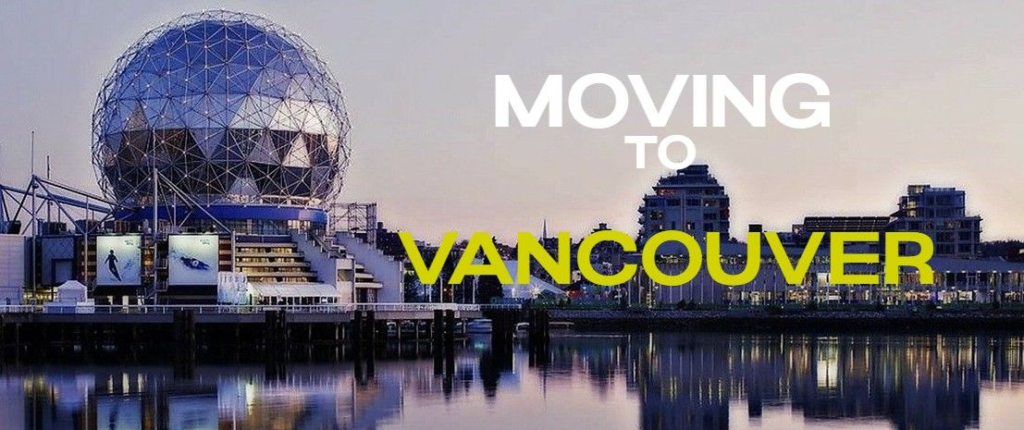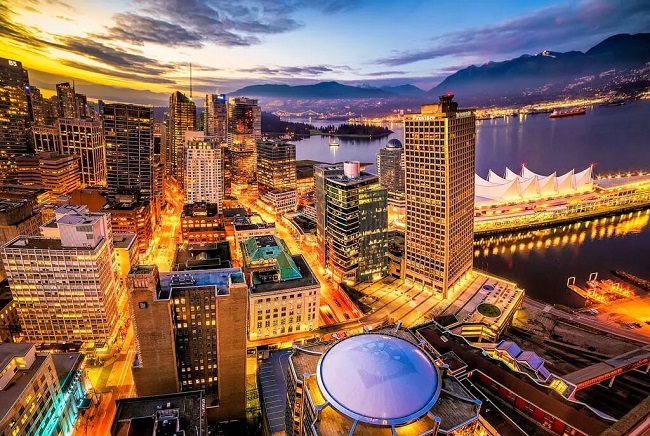Thinking about moving to Vancouver? It’s a commendable choice! Vancouver is located between the Pacific Ocean and the majestic Coast Mountains, Vancouver offers a lifestyle that seamlessly combines urban living with stunning natural beauty. This guide provides a comprehensive overview of everything you need to know about making Vancouver your new home. From neighborhoods to job prospects, schools to dining, and transportation to healthcare, we’ve got you covered in your journey to becoming a proud Vancouverite.

Fact File Of Vancouver
See the fact file of Edmonton here.
- Population in 2016: 631,486
- Average high temperatures in July: 22°C
- Average high temperatures in January: 6°C
- Number of rainy days (0.2mm or more) per year: 168
- Key industries: Technology, film and television, natural resources, tourism
- Average residential property price (July – September 2021): $1,200,000
- Time zone: PST (UTC -8 hours)
- Official City of Vancouver website: vancouver.ca
Cost of Living in Vancouver
Housing Costs
Housing is the most significant contributor to the high cost of living in Vancouver. Renting a one-bedroom apartment in the city center can cost you around $2,500 to $3,500 per month, while the same apartment outside the city center may be slightly more affordable, ranging from $1,800 to $2,500 per month.
If you’re considering purchasing property, Vancouver’s housing market has high average prices. A typical single-family home in the city can cost well over a million dollars. Be prepared for higher home prices compared to many other Canadian cities.
Food and Groceries
The cost of food in Vancouver can vary, but it’s generally more expensive than in other Canadian cities. A typical lunch at a local restaurant might cost around $15 to $20, while a fast-food combo meal can be about $10 to $12.
Grocery shopping for a week can range from $60 to $100 for a single person, depending on your eating habits and dietary choices. Prices for fresh produce, meat, and dairy products can be higher than in other parts of the country.
Vancouver boasts a diverse and robust job market, driven by a variety of industries. It’s known for its strong economy, which contributes significantly to the province of British Columbia and the country as a whole. The city’s strategic location, a thriving technology sector, and a growing film and television industry make it an attractive place for job seekers.
Key Industries
One of the major drivers of Vancouver’s job market is the technology sector. The city is often referred to as “Hollywood North” due to its booming film and television industry. The green economy and clean technology sector have also experienced substantial growth in recent years. Additionally, traditional industries like forestry, natural resources, and tourism play a significant role in the local economy.
Employment Opportunities
There are ample opportunities for both experienced professionals and newcomers in Vancouver. Jobs in software development, information technology, healthcare, and finance are often in high demand. The film and television industry, creative arts, and entertainment also provide numerous job opportunities.
Work-Life Balance
Vancouver is known for its exceptional work-life balance. The city’s residents value their quality of life and often seek positions that align with their lifestyle. With beautiful natural surroundings, access to outdoor activities, and a strong commitment to environmental sustainability, Vancouver’s job market reflects the city’s unique character.
Weather In Vancouver
Moderate Temperatures Year-Round
Vancouver enjoys mild temperatures year-round, thanks to its coastal proximity. Winters are typically wet but not extremely cold, with average highs around 8°C (46°F) and lows around 3°C (37°F). Snow is rare at lower elevations, and when it does occur, it usually doesn’t last long. Summers are warm but not scorching, with average highs around 22°C (72°F) and lows around 13°C (55°F). Heatwaves are uncommon.
Rainfall and Sunshine
Vancouver is known for its rainfall, especially during the fall and winter months. The city sees an average of 168 rainy days a year, with the highest rainfall between October and March. During these months, it’s not uncommon to experience prolonged rainy periods. However, summer months from June to September are relatively dry and offer plenty of sunshine, making them ideal for outdoor activities.
Mild Climate for Outdoor Enthusiasts
Vancouver’s climate caters to those who enjoy outdoor activities. With its mild weather, even during the winter, residents can engage in recreational pursuits like hiking, biking, and running year-round. The city’s stunning natural landscapes, including nearby mountains and the Pacific Ocean, provide an excellent backdrop for outdoor enthusiasts.
Microclimates
Vancouver’s geography creates microclimates that can vary significantly from one neighborhood to another. Areas near the ocean may experience milder and wetter conditions, while locations farther inland or at higher elevations can be drier and somewhat cooler.

Neighborhoods In Vancouver
Family-Friendly Neighborhoods
Vancouver boasts several family-friendly neighborhoods that prioritize safety, great schools, and a sense of community. Kerrisdale stands out with its tree-lined streets and quality housing options, while Kitsilano, often called “Kits,” offers a relaxed beachside atmosphere perfect for families. Shaughnessy, known for its historic homes, also attracts those looking for a prestigious and elegant living environment.
Student-Oriented Areas
Vancouver is a hub for education, attracting students from around the world. As such, there are neighborhoods where students feel right at home. UBC (University of British Columbia)‘s surroundings offer a lively academic atmosphere, while Dunbar is known for its youthful energy and proximity to both UBC and downtown. Commercial Drive, or “The Drive,” caters to a diverse student population with its multicultural vibe and affordability.
Up-and-Coming Neighborhoods
The city is constantly evolving, and several neighborhoods are emerging as exciting places to live. Mount Pleasant is a prime example, offering a mix of industrial heritage and modern development. It’s a haven for artists, creatives, and young professionals. Hastings-Sunrise, with its excellent food scene and growing popularity, is another up-and-coming gem.
Trendy Urban Districts
For those seeking the pulse of city life, Vancouver’s trendy urban neighborhoods have plenty to offer. Gastown, the city’s oldest neighborhood, combines historic charm with a vibrant dining and shopping scene. Yaletown, on the other hand, embodies modern urban living with its sleek high-rises and upscale eateries. Chinatown is a burgeoning hotspot with its fusion of tradition and innovation, making it an exciting place to live.
Quiet Residential Enclaves
Some neighborhoods offer peaceful and relaxed living. Dunbar-Southlands, with its spacious homes and leafy streets, provides a serene escape from city life. The West End is another tranquil residential enclave, nestled near the beach and Stanley Park, making it perfect for those who appreciate a balance of natural beauty and urban convenience.
Schools and Education In Vancouver
Primary and Secondary Schools
Vancouver’s primary and secondary education system is characterized by diversity, excellence, and accessibility. The Vancouver School Board (VSB) oversees a network of public schools, ensuring that students receive a high standard of education. In addition to public schools, the city is home to numerous private and international schools, offering various curriculums and teaching approaches to cater to students’ needs.
Post-Secondary Education
Vancouver is a major hub for higher education. The city is home to several prestigious institutions, including the University of British Columbia (UBC), consistently ranked among the top universities in the world. Simon Fraser University (SFU), another renowned institution, is known for its innovative programs and research opportunities. Moreover, British Columbia Institute of Technology (BCIT) excels in practical and technical education.
Healthcare In Vancouver
Public Healthcare
Vancouver’s public healthcare system is primarily managed by the British Columbia Ministry of Health. The province’s public healthcare program, Medical Services Plan (MSP), covers medically necessary hospital and physician services. Residents must enroll in the MSP and receive a CareCard, which provides access to essential medical services. There are several public hospitals, including Vancouver General Hospital, St. Paul’s Hospital, and Lions Gate Hospital, which offer a wide range of medical services and facilities.
Private Healthcare
In addition to public healthcare, Vancouver boasts a vibrant private healthcare sector. Private clinics, hospitals, and specialist services are readily available for those who prefer or require expedited care. Many private healthcare providers cater to residents and international patients, offering timely medical services and consultations.
Specialized Medical Facilities
Vancouver is home to a plethora of specialized healthcare facilities, including renowned cancer treatment centers, fertility clinics, and specialized surgery centers. Notable facilities include the BC Cancer Agency, the Genesis Fertility Centre, and the Cambie Surgery Centre, which offer advanced treatments and comprehensive care.
Alternative and Holistic Healthcare
The city is also recognized for its holistic and alternative healthcare options. It boasts numerous wellness centers, acupuncture clinics, naturopathic practices, and traditional Chinese medicine facilities, providing a wide array of health and wellness choices for the community.
Health Research and Innovation
Vancouver is an epicenter for health research and innovation, with various institutions, such as the University of British Columbia and the BC Children’s Hospital Research Institute, conducting cutting-edge medical research. This focus on innovation ensures that residents benefit from the latest medical advancements.
Emergency Services
Emergency healthcare services are efficiently managed in Vancouver, with the BC Ambulance Service providing rapid response and transportation to medical facilities in case of emergencies. The city’s emergency departments and trauma centers are equipped to handle various critical situations.
Transportation in Vancouver
Public Transit
The backbone of Vancouver’s public transportation is TransLink, the regional transportation authority, which operates an extensive network of buses, SkyTrain, SeaBus, and West Coast Express commuter trains. The SkyTrain is an automated rapid transit system connecting key areas like downtown, Burnaby, and Surrey, making it easy to move across the city. The SeaBus provides a scenic connection between downtown Vancouver and the North Shore. Buses cover a broad area, including the surrounding suburbs.
Cycling and Walking
Vancouver is renowned for its bike-friendly infrastructure, with numerous dedicated bike lanes and routes. The city’s mild climate encourages year-round cycling, and bike-sharing programs make it convenient for residents and tourists. Additionally, pedestrian-friendly neighborhoods and extensive sidewalks make walking a common and enjoyable mode of transport.
Ferries
With its coastal location, Vancouver incorporates ferry services into its transportation system. The AquaBus and False Creek Ferries offer a unique way to traverse False Creek and visit Granville Island, providing both a practical and scenic experience.
Road Network
While Vancouver aims to promote alternative transportation, it still maintains a well-developed road network. Major routes such as Highway 1, Lions Gate Bridge, and the Stanley Park Causeway connect the city to other parts of the Lower Mainland.

